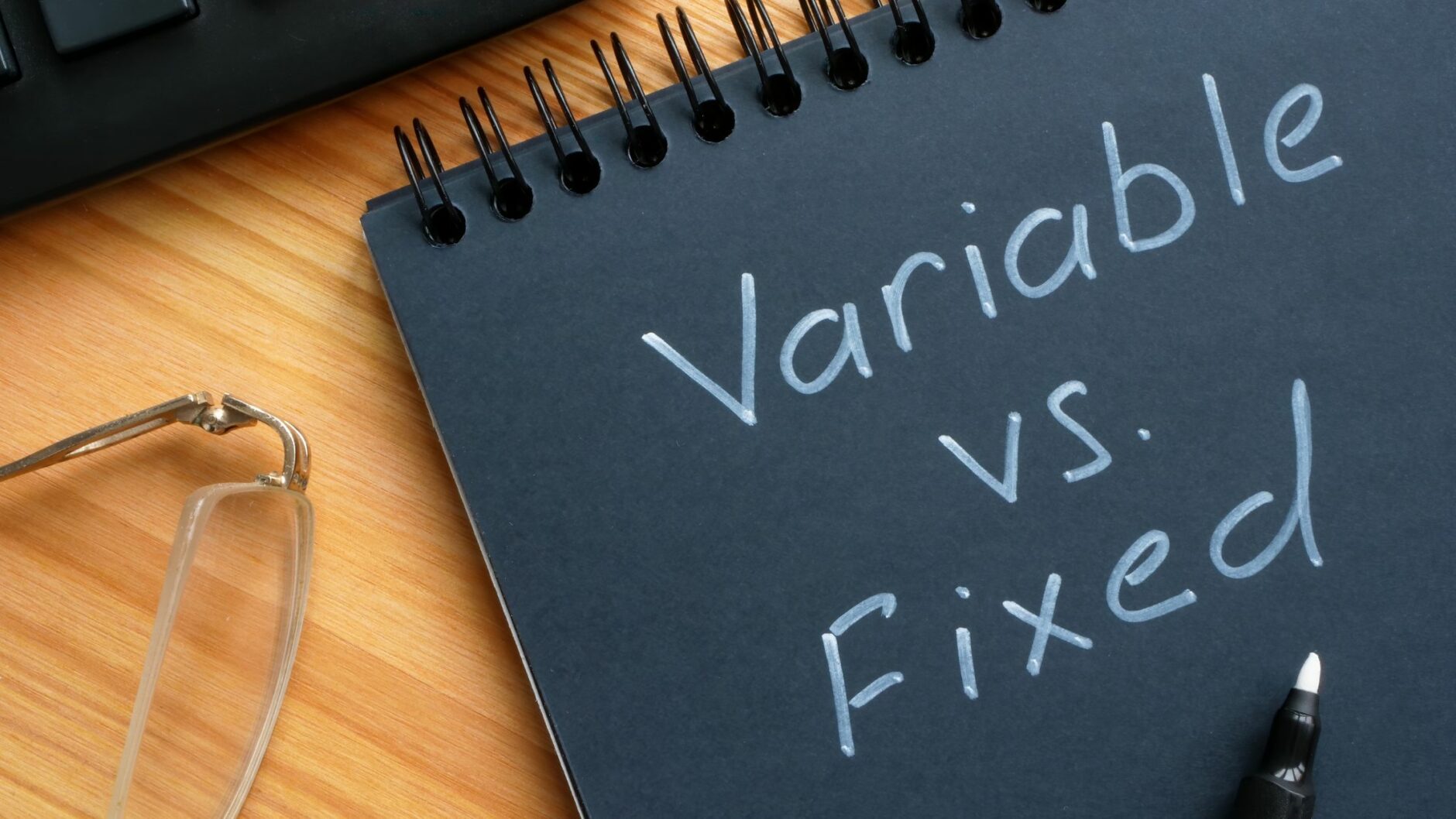A variable rate boat loan has an interest rate that varies with time based on the market condition, while in a fixed rate loan, the interest rate remains constant throughout the loan term. Therefore, borrowers who like to have predictable loan payments usually choose a fixed rate loan over a variable rate loan. Other borrowers find variable rate loans attractive because of low introductory rates.

Variable Rate Loan
This is the type of loan with an interest rate that changes over time due to the changes in a country’s economy. In the US, the Federal Reserve determines the interest rate at a particular point in time. During periods when there is slow economic development, the Federal Reserve can lower the interest rate to stimulate business development and reduce unemployment rates. Reducing the rates decreases the borrowing costs for variable rate loans, making it possible for more people to access money and establish businesses or boost their capital.
You can get most fixed rate loans with a variable rate, including student loans and mortgages. Personal and auto loans are usually issued with a fixed rate, but you can still find lenders who are willing to offer variable rate terms. Therefore, some lenders can give you a variable boat loan.
Sometimes, borrowers opt for a partially variable and fixed loan. This kind of loan is referred to as the 5/1 adjustable-rate loan, which requires you to pay the loan with a fixed rate for the initial five years, and the rate can vary each year afterward.
Overall, variable rate loans usually have a lower interest rate at the beginning than fixed loans since they are a riskier option for borrowers.
Sometimes, the interest rates can increase, which can significantly increase the cost of borrowing. This risk is something that a consumer must keep in mind when choosing the kind of loan to take.
Nevertheless, a variable rate loan is a good choice for borrowers with good financial standing who can afford to take risks or clear the loan fast.
Pros and cons of a variable rate loan
Pros
- The interest rate is usually less than a fixed loan, particularly in the first few years.
- The loans come with favorable terms, such as the small introductory rates at the start of a loan term.
- Your loan repayment will reduce when interest rates decrease.
Cons
- Due to fluctuating rates, it will be impossible to predict or plan future spending.
- Loan repayments go up when interest rates increase.
- Loans may get costlier than fixed rate loans if interest rates increase rapidly.
Fixed Rate loan
A fixed rate loan is a loan whereby the rate never changes during the whole repayment period. Therefore, the cost of borrowing money remains the same during the lifetime of the loan, so it won’t be affected by changes in the market.
Lenders’ interest rate for any loan is called a prime rate. In the U.S., the prime rate is based on the rate that the Federal Reserve sets for banks to use at a given point in time.
For a loan that requires to be paid monthly, like a boat loan, having a fixed rate allows a borrower to have predictable monthly payments.
A lot of borrowers opt for this loan since it enables them to budget and plan for their loan payments.
This kind of loan is particularly favorable for consumers with a steady and low to medium income because they won’t have to worry about increasing rates, which could render them unable to pay their monthly loan payments.
The Consumer Financial Protection Bureau (CFPB) releases a range of rates that consumers can anticipate at any time based on their location. The bureau provides revised rates twice a week, and borrowers can add information like loan type, principal, and credit score and evaluate the fixed interest rate they could pay at any specific time. They can then compare it to the adjustable rate.
How do you calculate fixed interest loan costs?
When you want to know the cost of a fixed interest loan, all you need is the loan repayment period, the interest rate, and the loan amount. Keep in mind that no matter the kind of loan you choose, your income and credit scores will affect the interest rate you pay for it. You can use an online calculator to know the fixed interest rate cost.
Pros and cons of a fixed rate boat loan
Pros
- A borrower will be aware of what their monthly payment will be for the entire repayment period.
- The borrower won’t be concerned about fluctuations in the market or their interest rate increasing.
- It is easier to calculate the total cost of borrowing.
- A borrower can choose their loan term.
Cons
- The interest rate could be more than the variable rates
- To enjoy lower rates, a borrower has to refinance and end up spending more money due to fees
- If the interest rates drop in the future, borrowers cannot take advantage of the new rate
- A borrower may pay fees if they decide to adjust terms or pay off the loan quickly
Variable vs Fixed Rate Loans: Which one should you choose?
Research indicates that with time, a variable rate loan is cheaper than a fixed rate loan. Nevertheless, these findings are based on past data, which may not accurately reflect what will happen in the future. You have to consider the loan repayment period. If your loan term is long, the interest rate will significantly impact your payments.
When deciding whether to take a variable or fixed rate loan, you need to look at your preferences and financial situation. Evaluate your desire for security, financial flexibility, and income. Your current circumstances will determine which loan you will pick between these two, and remember, many other loan products can be perfect for any borrower, depending on their financial situation.
Besides these factors, there are other things you can consider when deciding whether you want a variable or fixed rate loan. These are:
Interest rate spread
Loans have different costs. When choosing which loan to take, analyze their terms and see which one is more affordable than the other.
Interest rate prediction and trends
If you predict that the interest rates will rise, opt for a fixed rate loan. But if you expect the rates to reduce, you can take your chances and choose a variable rate loan, which will be perfect, especially in the short term.
Anticipated personal income prediction
The choice between variable or fixed rate is based on the desire for security. Analyze your income status, especially your savings, potential salary increment, and job stability. You can select a variable rate loan if you predict that your salary will increase down the line, and you might have a higher income that will help you easily make higher monthly payments.
Loan term
Predicting long-term market conditions may be difficult. Make your decision based on the short-term market conditions if you expect to pay off the loan within a short time.
Generally, if your main goal is to minimize risks, it would be best to choose a fixed rate loan, since, with this loan, you will always know what the interest rate will be and the cost and repayment schedule. It also makes more sense to get a fixed rate loan when the rates are at an all-time low because if you take a variable rate loan at such a time, the rates could go up, and you will end up paying more money. A variable rate loan is only ideal when the interest rates are reduced.
Is it possible to move from a variable rate to a fixed rate?
The answer is yes. Lenders usually let borrowers change from a variable rate to a fixed rate. You will need to pay specific fees when changing the loan terms. It is rare to find a borrower changing from a fixed rate loan to a variable rate loan.
Conclusion
The difference between a variable and fixed rate boat loan is tremendous. Lenders can give you a variable or fixed rate boat loan when you want to finance the purchase of a loan. A variable rate changes over time, meaning it can either reduce or increase in the future depending on the economic situation. Therefore, your monthly payments will also change. On the other hand, a fixed rate remains the same during the entire loan repayment payment, making loan payments predictable. It is essential to know the pros and cons of each type of loan, so you can make an informed decision. It would help if you also considered various factors to avoid defaulting on your loan because the interest rate has increased, and you can no longer afford to pay the monthly payments. If you are someone who values security, you will be better off choosing a fixed rate boat loan. Alternatively, if you have the financial flexibility that can allow you to pay off a loan at a higher rate in the future, you can choose a variable rate loan.




